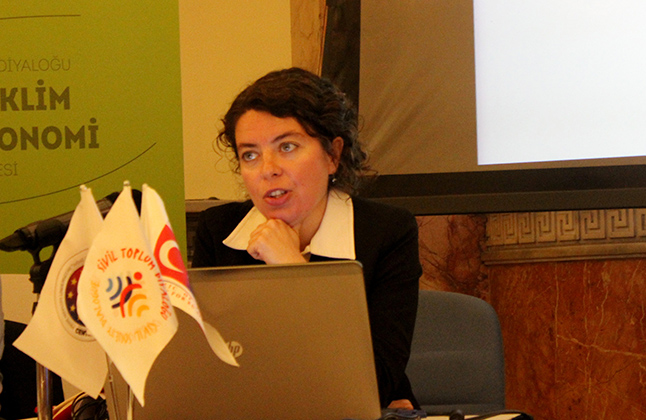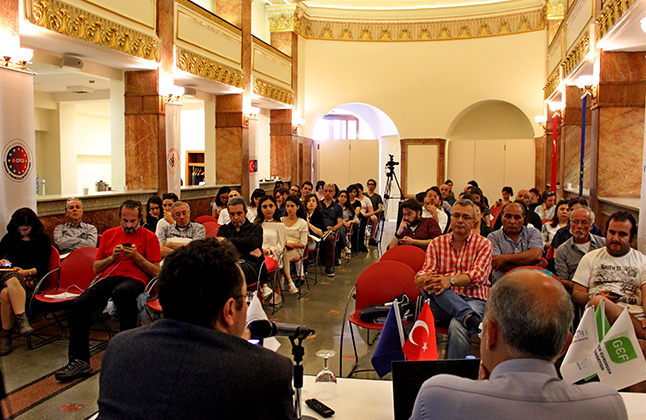30/06/2017
The closing meeting of the "Green Climate, Green Economy" project implemented by Sabancı University Istanbul Policy Center, Green Thinking Society and the Green European Foundation, and the presentation of the project's final output, the "Green Economic Policies for the Climate" report, were held at the Minerva Han in Karaköy on Thursday, June 1, 2017.

Following introductory remarks by Project Coordinator Özgecan Kara from the Green Thinking Society and Project Scientific Coordinator Ümit Şahin from Istanbul Policy Center, the report was presented by principal author Ahmet Atıl Aşıcı.
The joint project by three institutions that work on various aspects of climate change and develop policies makes policy recommendations under three headings: climate-friendly city, climate-friendly energy, and climate-friendly soil. The report recommends that renewable energy is integrated into urban transformation projects and regulatory obstructions are removed, legislation for restorative agriculture is adopted, incentives are provided for passive buildings which minimize energy consumption and greenhouse gas emissions, the Metropolitan Law numbered 6360 is revised and city centers are planned in a way that enables commuting on bicycles. Other contributors of the project were consultants Sevil Acar from Kemerburgaz University, Osman Balaban from METU, Barış Karapınar from Boğaziçi University, and Ateş Uğurel from Solarbaba.
“There is a general opinion that the cost of climate change prevention is too high”
In her introductory remarks, Green Thinking Society Project Coordinator Özgecan Kara discussed the meetings held for drafting the report, as well as the contributions of interviewed individuals and the participatory nature of the project.

Istanbul Policy Center Project Scientific Coordinator Ümit Şahin said that there was a prevalent general opinion that the cost of solutions to climate change was too high to be paid. Şahin said, “We must publish analyses which show the economic backing to proposed solutions in order to change popular opinion. The report we present today is in a way the sequel of the Low-Carbon Development Ways and Priorities Report issued previously by Istanbul Policy Center."
“Holistic policies are needed for sustainability”
Istanbul Technical University professor and the report's principal author Ahmet Atıl Aşıcı said that Turkey had one of the highest rates of increase in greenhouse gas emissions. Aşıcı argued that the transition to a green economy had to be achieved with a reduction in the government's weight in the economy and expansion of its regulatory role. Discussing preferences in economic policy, Aşıcı emphasized the importance of following holistic policies to achieve economic and ecological sustainability.

“There are obstacles to transformation”
Ahmet Atıl Aşıcı said the following about the obstacles to transitioning to a green economy: “The greatest obstacle is incentivizing fossil fuels. The objectives of the Ministries of Energy and Agriculture clash due to fragmented approaches. Decision-making processes, policies and strategies are determined and implemented in non-participatory ways, which create conflicts of interest."
Decentralized, renewable energy solutions, commodization of the city, and investment in soil

Sevil Acar from Kemerburgaz University said that the green economy advocated by the project was small-scale and decentralized, being founded on participatory mechanisms. Acar said, “Turkey is ideally positioned for the transformation to green economy. It has a dynamic private sector and there is great interest in renewable energy contracts."

Osman Balaban, a consultant in the project, commented “We need a decentralization program that increases the power available to local administrations and strengthens their financial structure. We also need to change our perspective on urban transformation."

Barış Karapınar discussed the importance and potential of soil in combating climate change. Saying that the potential was not fully utilized, Karapınar continued: “Investments that will improve the organic matter content of soil are effective in retaining carbon, and are cheaper. These investments can also improve soil fertility.”
Also speaking of unprocessed agriculture, Karapınar said that shallow farming increased the soil's water retention rate, biodiversity, and carbon retention ability. Karapınar noted that soil had great potential in mitigating and adapting to the effects of climate change, and invited less political debate.





